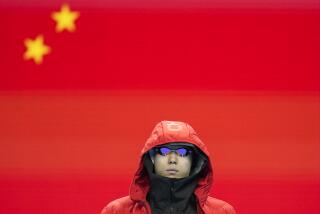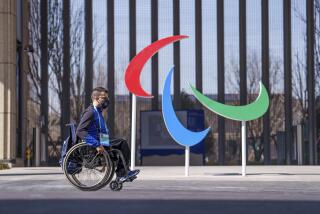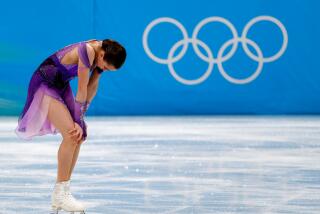Widespread retesting finds 31 athletes doped at 2008 Beijing Olympics
Thirty-one athletes who competed in the 2008 Beijing Olympics have tested positive for banned substances in a sweeping reexamination of doping samples from those Games.
The International Olympic Committee said Tuesday that it used improved methods to reanalyze 454 samples from Beijing, focusing on athletes who could be headed for the upcoming Summer Games in Rio de Janeiro.
The athletes represented 12 nations and will be notified in coming days, the IOC said. They were not publicly identified.
See more of our top stories on Facebook >>
âThis is a powerful strike against the cheats we do not allow to win,â IOC President Thomas Bach said. He added: âWe keep samples for 10 years so the cheats know they can never rest.â
Olympic officials plan to expand their review to include 250 samples from the 2012 London Games, again with an emphasis on athletes still actively competing.
The enforcement program comes at a difficult time for international sports.
The entire Russian track and field program was suspended from international competition after a World Anti-Doping Agency report alleged systemic cheating among athletes, coaches and officials.
Get the latest in sports with our free newsletter >>
Since the beginning of the year, dozens of athletes from around the world have tested positive for meldonium, a heart medication recently added to the banned list.
More recently, the media has reported on alleged cheating and manipulation of samples by the Russians at the 2014 Sochi Olympics.
These and other developments prompted a special session of the IOCâs executive board on Tuesday.
The board said it will ask the World Anti-Doping Agency to investigate the Sochi laboratory where cheating is alleged to have taken place in 2014.
Though the IOC will take medals away from athletes caught having used banned substances at previous Olympics, the emphasis of Tuesdayâs announcement was clearly on stopping suspected cheaters from competing this summer.
With the Games fewer than 100 days away, officials vowed to act swiftly.
âBy stopping so many doped athletes from participating in Rio, we are showing once more our determination to protect the integrity of the Olympic competitions ... so that the Olympic magic can unfold in Rio de Janeiro,â Bach said.
ALSO
Russian officials step up campaign to have their track athletes reinstated for Olympics
Recommendation by anti-doping officials could bar Kenya from 2016 Rio Olympics
Anti-doping official wants TV and sponsors to help fund fight against cheaters
More to Read
Go beyond the scoreboard
Get the latest on L.A.'s teams in the daily Sports Report newsletter.
You may occasionally receive promotional content from the Los Angeles Times.











